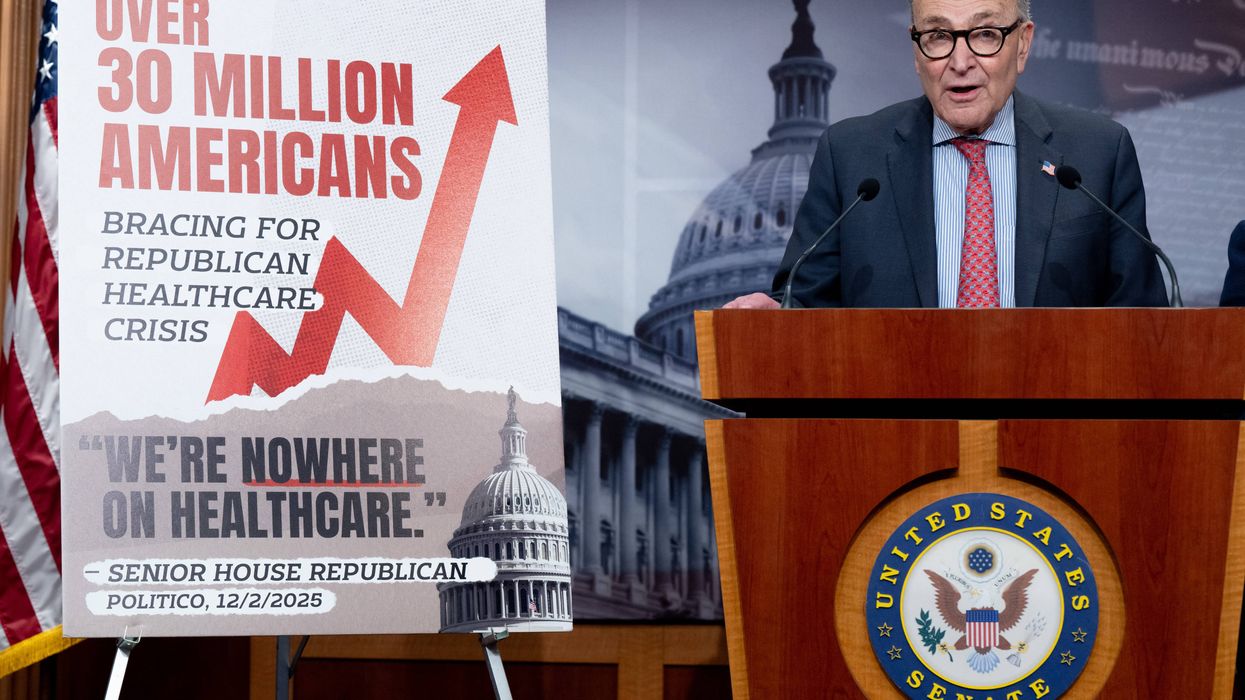July, 20 2015, 02:00pm EDT

Ignoring Objections of Major Medical Groups, Wisconsin Governor Scott Walker Signs Cruel Ban on Abortion at 20 Weeks of Pregnancy
WISCONSIN
Wisconsin Governor Scott Walker signed a measure into law today which bans safe and legal abortion after twenty weeks of pregnancy with an extremely narrow exception for medical emergencies.
HB179--which is slated to take effect next year--was opposed by major medical groups in the state, including the Wisconsin Section of the American Congress of Obstetricians and Gynecologists (ACOG), the Wisconsin Medical Society, the Wisconsin Academy of Family Physicians, and the Wisconsin Chapter of the American Academy of Pediatrics because of the dangers to a woman's health and wellbeing. A group of 100 obstetrician-gynecologists directed a letter to Governor Walker and the Wisconsin legislature opposing the ban because "SB 179 would block Wisconsin ob-gyns from being able to treat our patients in a medically appropriate and humane manner. This bill would undoubtedly place us in the unconscionable position of having to watch our patients and their loved ones undergo emotional trauma, illness and suffering during what is already a difficult time."
Wisconsin women who seek abortion services already face extreme barriers to care, as there are only four clinics providing abortion services in the entire state. Additionally, Wisconsin clinics have been fighting to keep their doors open in the face of a clinic shutdown law since 2013.
Said Nancy Northup, president and CEO of the Center for Reproductive Rights:
"Wisconsin politicians have criminalized safe, legal abortion services at the same time they are attempting to eliminate all abortion services by shutting down clinics with sham laws and red tape.
"With this law, women in Wisconsin will soon face a catch-22 of shrinking options earlier in pregnancy and a complete ban on services later in pregnancy. Women deserve to make their own health care decisions with the medical professionals she trusts, not interference from her governor or legislature who presume to know better. "
The U.S. Supreme Court has consistently held--first in Roe v. Wade and again in Planned Parenthood v. Casey--that states cannot ban abortion prior to viability. Last year, the Supreme Court refused to review a decision permanently blocking Arizona's ban on abortion at 20 weeks of pregnancy, and courts in Idaho and Georgia have also recently blocked similar pre-viability bans.
Bans on abortion at 20 weeks take critical medical decisions out of the hands of women and their trusted health care providers at a time when those services may be the best medical option for a variety of reasons. Furthermore, measures like Wisconsin's prohibit services at a point at which a woman is just receiving the results of critical tests to determine the health of her pregnancy--and potentially the presence of life-threatening complications and severe fetal abnormalities.
The devastating impact of these cruel laws are evident in stories like Whitney's, a woman who has spoken out about her experience needing an abortion after 20 weeks in North Carolina, one of 11 states in the U.S. where the services are currently banned. After receiving a difficult diagnosis, she was forced to travel out of state to get the safe, legal care she needed and had a constitutional right to obtain.
Harmful and unconstitutional restrictions like these further underscore the need for the federal Women's Health Protection Act (S. 217/HR. 448)--a bill that would prohibit states like Wisconsin from imposing unconstitutional restrictions on reproductive health care providers that apply to no similar medical care, interfere with women's personal decision making, and block access to safe and legal abortion services.
The Center for Reproductive Rights is a global human rights organization of lawyers and advocates who ensure reproductive rights are protected in law as fundamental human rights for the dignity, equality, health, and well-being of every person.
(917) 637-3600LATEST NEWS
Republicans in Congress Ripped for 'Entirely Preventable' 2026 Healthcare Crisis
"Working families simply can't afford to pay more money for worse care. We need to extend ACA tax credits to lower costs."
Dec 31, 2025
With millions of Americans facing health insurance premium hikes and Affordable Care Act tax credits expiring at midnight, critics, including congressional Democrats, called out Republicans on Capitol Hill for kicking off 2026 with a nationwide healthcare crisis.
"When the clock strikes midnight, the fallout of the GOP's premium hikes will ripple throughout the nation," Protect Our Care chair Leslie Dach said in a Wednesday statement. "This new year brings a healthcare catastrophe unlike anything this nation has ever seen. Hardworking Americans will be sent into crippling medical debt, emptying out their savings just to see a doctor. Others will be forced to live without the life-saving coverage they need. Untold tens of thousands will die from preventable causes."
"And hundreds of hospitals, nursing homes, and maternity wards will shutter or be at risk of disappearing out of thin air," Dach warned. "When the American people go to the ballot box in November, they won't forget who's responsible for all of this chaos and carnage. They won't forget who's responsible for their skimpier coverage, sky-high premiums, and vanishing hospitals."
Republican lawmakers declined to extend ACA subsidies in their so-called One Big Beautiful Bill Act (OBBBA), which is also expected to slash an estimated $1 trillion in Medicaid spending over the next decade, leading to health clinic closures, while giving more tax breaks to the ultrawealthy. Even the longest federal government shutdown in history—which a handful of moderate Senate Democrats ultimately ended without any real concessions—couldn't convince the GOP to extend the expiring tax credits.
Senate Minority Leader Chuck Schumer (D-NY), who has faced calls to step down over his handling of both shutdowns this year, stressed in a Wednesday statement that the healthcare crisis beginning Thursday "was entirely preventable—caused by Republican obstruction and total inaction."
"Millions of Americans will lose their healthcare, and millions more will see their costs spike by thousands of dollars," he continued. "Millions of hardworking families, small business owners and employees, older Americans, and farmers and ranchers will face impossible choices."
Specifically, about 22 million people who receive subsidies face higher premiums next year, and experts warn nearly 5 million people could become uninsured if the tax credits aren't extended. That's on top of the at least 10 million people expected to lose Medicaid coverage over the next decade, thanks to the OBBBA that President Donald Trump signed into law this summer.
Noting that the expiring subsidies are set to leave millions of Americans without health insurance, House Minority Leader Hakeem Jeffries (D-NY) declared on social media Wednesday, "Republicans don't give a damn."
The Chicago Tribune on Wednesday shared the story of Eleanor Walsh, of St. John, Indiana. She and her husband, who are both self-employed, paid around $9,100 for health insurance this year. In 2026, it will increase to $23,400. To save money, they are going with another plan, which has a $10,130 deductible for each of them, she told the newspaper.
"We're going through every expense we have," said Walsh, whose family has over $10,000 in medical debt from her husband's recent open-heart surgery. "It's going to be a rough year."
In Alta, Wyoming, Stacy Newton and her husband similarly run small businesses and buy health insurance through the ACA marketplace. She was diagnosed with chronic leukemia last year. The cheapest option to cover the couple and their teenage kids next year includes a $3,573 monthly premium, or nearly $43,000 for the year, with a $21,200 deductible.
"It's terrifying... We're not rich, we're not poor. We're a standard, middle-class family, and somehow now I can't afford health insurance," Newton told the Washington Post. "If my leukemia acts up, I'm up a creek... I just don't have a solution yet."
"I just officially canceled my ACA marketplace insurance for 2026," she told the paper earlier this week. "How on Earth is this going to unfold for millions of people in America?"
While Americans are forced to make coverage decisions before open enrollment ends in mid-January, without any promise of the subsidies returning, Schumer signaled that Democrats are still fighting for a fix in Washington, DC.
"Senate Republicans had multiple chances to work with Democrats to stop premiums from skyrocketing—and every time, they blocked action," he said. "While Republicans chose to do nothing and ignore the pain families will feel starting tomorrow, Senate Democrats are fighting to lower costs, protect coverage, and make life more affordable—not harder—for American families."
Four Republicans in the House of Representatives have signed on to a discharge petition to force a January vote on Democratic legislation to extend the credits for three years. Roll Call reported Tuesday that "with the knowledge that a procedural vote on a similar bill was rejected in the Senate, a bipartisan group of senators is working on a compromise to extend the credits."
However, as the outlet also pointed out, Senate Majority Leader John Thune (R-SD) has called Democrats' three-year extension of the tax credits a "waste of money."
Sen. Chris Van Hollen (D-Md.)—one of the lawmakers who has used the current healthcare debate to renew demands for Medicare for All—took aim at Thune on social media Monday.
Other lawmakers have kept up the battle for universal healthcare this week. Sen. Jeff Merkley (D-Ore.) said Tuesday that "everyone in America—no matter what their ZIP code is—should have access to the quality healthcare they need, when they need it. That's why I'm fighting to put us on the path to Medicare for All."
Sen. Bernie Sanders (I-Vt.)—who reintroduced the Medicare for All Act in April with Democratic Reps. Pramila Jayapal (Wash.) and Debbie Dingell (Mich.)—highlighted Sunday that "millions of Americans remain at jobs they hate for one reason: the health insurance they receive."
"That's absurd," he said. "Universal healthcare will give Americans the freedom to choose the work they want without worrying about healthcare coverage. Another reason for Medicare for All."
Absent any real progress on the ACA, let alone Medicare for All, in DC, "at least a dozen states are working to shield people from soaring health insurance costs following Congress' failure to extend Obamacare subsidies for tens of millions of Americans," Politico reported Monday.
Elected officials are taking action in states including California, Colorado, Connecticut, Maryland, and New Mexico, the last of which is the only one so far to cover all expiring subsidies, according to the outlet.
"We can carry the cost for a little bit, but at some point, we will need Congress to act," said the speaker of New Mexico House of Representatives, Javier Martínez (D-11). "No state can withstand to plug in every single budget hole that the Trump administration leaves behind."
Keep ReadingShow Less
Trump Vetoes Colorado Clean Water Bill—Then Tells State's Officials to 'Rot in Hell'
The bill vetoed by Trump would have provided funds to finish the Arkansas Valley Conduit, a 130-mile pipeline designed to deliver clean, filtered water to 50,000 residents in the eastern part of the state.
Dec 31, 2025
President Donald Trump issued the first veto of his second term this week when he rejected a bill with bipartisan support aimed at ensuring access to clean drinking water in rural Colorado.
As reported by Colorado Public Radio on Tuesday, the bill in question would have provided funds to finish the Arkansas Valley Conduit, a 130-mile pipeline designed to deliver clean, filtered water to 50,000 residents in the eastern part of the state.
In a statement announcing his video of the bill, Trump cited concerns about the size of the US deficit, even though the Congressional Budget Office has estimated that finishing the conduit will cost less than $500,000.
"My administration is committed to preventing American taxpayers from funding expensive and unreliable policies," said Trump, whose signature legislation, the One Big Beautiful Bill Act, is projected to increase the US deficit by $3.4 trillion over the next decade. "Ending the massive cost of taxpayer handouts and restoring fiscal sanity is vital to economic growth and the fiscal health of the nation."
Rep. Lauren Boebert (R-Colo.), a longtime Trump ally who sponsored the legislation, blasted the president for vetoing "a completely non-controversial, bipartisan bill that passed both the House and Senate unanimously."
Boebert also hinted that Trump's reasons for passing the bill could be political retribution over her effort to force the release of files related to the criminal prosecution of the late convicted sex offender Jeffrey Epstein, who for years was a friend of the president.
"I sincerely hope this veto has nothing to do with political retaliation for calling out corruption and demanding accountability," Boebert said. "Americans deserve leadership that puts people over politics."
It's not clear what Trump's motives were for vetoing the bill, though he has been feuding with elected officials in Colorado over the continued imprisonment of Tina Peters, the former county clerk of Mesa County, Colorado who was convicted in 2024 of seven charges related to her allowing unlawful access to voting machines in the wake of the 2020 presidential election.
Trump has demanded that Colorado release Peters, and he even went so far as to give her a presidential pardon, even though she was convicted on state charges rather than federal charges where such a pardon would carry real legal weight.
In a New Year's Eve Truth Social post, Trump once again made false claims about Peters' case.
"God Bless Tina Peters, who is now, for two years out of nine, sitting in a Colorado Maximum Security Prison, at the age of 73, and sick, for the 'crime' of trying to stop the massive voter fraud that goes on in her State," Trump wrote.
In reality, there is no evidence of widespread voter fraud in Colorado during the 2020 election.
Trump finished off his post by lashing out at Democratic Colorado Gov. Jared Polis and Mesa County District Attorney Dan Rubinstein, a Republican whose office successfully put Peters in prison for a nine-year sentence.
"To the Scumbag Governor, and the disgusting 'Republican' (RINO!) DA, who did this to her (nothing happens to the Dems and their phony Mail In Ballot System that makes it impossible for a Republican to win an otherwise very winnable State!), I wish them only the worst," Trump wrote. "May they rot in Hell. FREE TINA PETERS!"
Keep ReadingShow Less
ICE Plots $100 Million 'Wartime Recruitment' Drive Aimed at Hiring Gun Enthusiasts
The propaganda blitz will be aimed at "people who have attended UFC fights, listened to patriotic podcasts, or shown an interest in guns and tactical gear," according to the Washington Post.
Dec 31, 2025
The Trump administration is planning a massive propaganda campaign aimed at recruiting thousands of new federal immigration enforcement officers to carry out its mass deportation agenda.
The Washington Post reported on Wednesday that it had obtained internal documents revealing that US Immigration and Customs Enforcement (ICE) is planning to spend $100 million over the next year on what the agency describes as a "wartime recruitment" drive.
The propaganda blitz will be targeted at highly specific demographics, including "people who have attended UFC fights, listened to patriotic podcasts, or shown an interest in guns and tactical gear," according to the Post.
The ICE drive would also use an ad-targeting technique called "geofencing" to send recruitment ads to users' phone browsers if they are in the vicinity of certain locations, such as military bases, NASCAR races, college campuses, and gun shows.
The ads being designed for the recruitment drive will be based around current appeals that depict joining ICE as part of a "sacred duty" to "defend the homeland" from "foreign invaders," the Post reported.
This rhetoric is similar to the language used in a recent ICE job post flagged by University of Wisconsin–Madison sociologist Jess Calarco. The listing asked prospective recruits if they are “ready to defend the homeland” by joining “an elite team dedicated to... securing our nation’s safety.”
Calarco noted that the job post "reads like a video game ad," which she said "is almost certainly by design."
Sarah Saldaña, a director of ICE under the Obama administration, told the Post that it is worrying to see the Trump administration casting such a wide net for people who lack any experience in law enforcement and who may be eager for what the Post described as "all-out combat."
The recruitment blitz comes amid new indications that the Trump administration's mass deportation campaign is falling far short of its goals.
The New Republic's Greg Sargent on Wednesday wrote that immigration arrests this year have fallen far short of the goal of 3,000 people per day set by top Trump aide Stephen Miller, and it seems highly unlikely that Miller will realize his dream of deporting 1 million people per year.
Aaron Reichlin-Melnick, a senior fellow with the American Immigration Council, told Sargent that "it's clear that they have not achieved the shock-and-awe campaign of mass deportations that they wanted, and they are still running into quite a lot of obstacles."
Reichlin-Melnick also predicted that "there will still be millions of people here who are undocumented" after Trump leaves office in 2028, as the administration "will not be able to deport even the majority of undocumented immigrants in four years."
The Trump administration earlier in the year announced plans to entice new ICE recruits by offering them $50,000 sign-up bonuses and assistance with repaying student loans in a bid to double the agency's head count.
Keep ReadingShow Less
Most Popular


